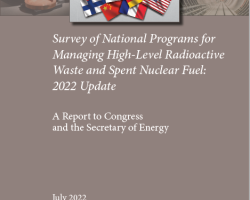Category of Content
Siting Experience Documents Only
Publication Date
Subject Matter
Keywords
Preliminary Report Degradation Evaluation and Aging Management of Bolted Closure Joints?
Preliminary Report Degradation Evaluation and Aging Management of Bolted Closure Joints?
EPRI/DOE High-Burnup Fuel Sister Rod Test Plan Simplification and Visualization
EPRI/DOE High-Burnup Fuel Sister Rod Test Plan Simplification and Visualization
Concepts for Small-Scale Testing of Used Nuclear Fuel
Concepts for Small-Scale Testing of Used Nuclear Fuel
Component Concepts for Advanced Dry Storage Investigations
Component Concepts for Advanced Dry Storage Investigations
Managing Aging Effects on Dry Cask Storage Systems for Extended Long-Term Storage and Transportation of Used Fuel
Managing Aging Effects on Dry Cask Storage Systems for Extended Long-Term Storage and Transportation of Used Fuel
Technical Work Plan: Environmental Degradation of Materials Relevant to Interim Storage and Permanent Disposal of Used Nuclear Fuel
Technical Work Plan: Environmental Degradation of Materials Relevant to Interim Storage and Permanent Disposal of Used Nuclear Fuel
Online Waste Library (OWL) and Waste Forms Characteristics Annual Report
Online Waste Library (OWL) and Waste Forms Characteristics Annual Report
Task Order 12 Standardized Transportation, Aging an
Task Order 12 Standardized Transportation, Aging an
Materials for Consideration in Standardized Canister Design Activities??
Materials for Consideration in Standardized Canister Design Activities??
Socio-technical multi-criteria evaluation of long-term spent nuclear fuel management strategies: A framework and method
Socio-technical multi-criteria evaluation of long-term spent nuclear fuel management strategies: A framework and method
In the absence of a federal geologic repository or consolidated, interim storage in the United States, commercial spent fuel will remain stranded at some 75 sites across the country. Currently, these include 18 “orphaned sites” where spent fuel has been left at decommissioned reactor sites.
Interim Storage, Environmental Justice, and Generational Equity
Interim Storage, Environmental Justice, and Generational Equity
With the termination of the Yucca Mountain project, which was proposed to be our nation’s first repository for the disposal of military and civilian spent nuclear fuel and high-level radioactive waste, the future of nuclear waste management and disposal in this country became increasingly uncertain. Interim storage has been advocated by many as a temporary solution while a permanent solution is studied for potentially several more decades to come.
Fostering stakeholder involvement across generations - participation after site selection
Fostering stakeholder involvement across generations - participation after site selection
In October 2022, the NEA Forum on Stakeholder Confidence (FSC) organised, in collaboration with the Belgian Agency for Radioactive Waste and Enriched Fissile Materials (ONDRAF/NIRAS), a national workshop in Dessel, Belgium, to explore the topic of stakeholder involvement across generations.
Building on previous work on this topic, participants gathered to discuss how to keep local communities involved in radioactive waste management after site selection, how to engage youth as key stakeholders and which approaches can be used to communicate with stakeholders now and in the future.
The Morally Desirable Option for Nuclear Power Production
The Morally Desirable Option for Nuclear Power Production
This paper reflects on the various possible nuclear power production methods from an ethical perspective. The production and consumption of nuclear power give rise to the problem of intergenerational justice; in other words, we are depleting a nonrenewable resource in the form of uranium while the radiotoxic waste that is generated carries very long-term potential burdens. I argue that the morally desirable option should therefore be to seek to safeguard the interests of future generations.
Investigation of Nuclide Importance to Functional Requirements Related to Transport and Long-Term Storage of LWR Spent Fuel
Investigation of Nuclide Importance to Functional Requirements Related to Transport and Long-Term Storage of LWR Spent Fuel
SCALE-4 Analysis of Pressurized Water Reactor Critical Configurations: Volume 3-Surry Unit 1 Cycle 2
SCALE-4 Analysis of Pressurized Water Reactor Critical Configurations: Volume 3-Surry Unit 1 Cycle 2
Survey of National Programs for Managing High-Level Radioactive Waste and Spent Nuclear Fuel: 2022 Update
Survey of National Programs for Managing High-Level Radioactive Waste and Spent Nuclear Fuel: 2022 Update
In October 2009, the U.S. Nuclear Waste Technical Review Board (Board or NWTRB) published Survey of National Programs for Managing High-Level Radioactive Waste and Spent Nuclear Fuel. For each of the 13 national programs studied, the report catalogued 15 institutional arrangements that had been set in place and 15 technical approaches that had been taken to design repository systems for the long-term management of high-activity radioactive waste.

